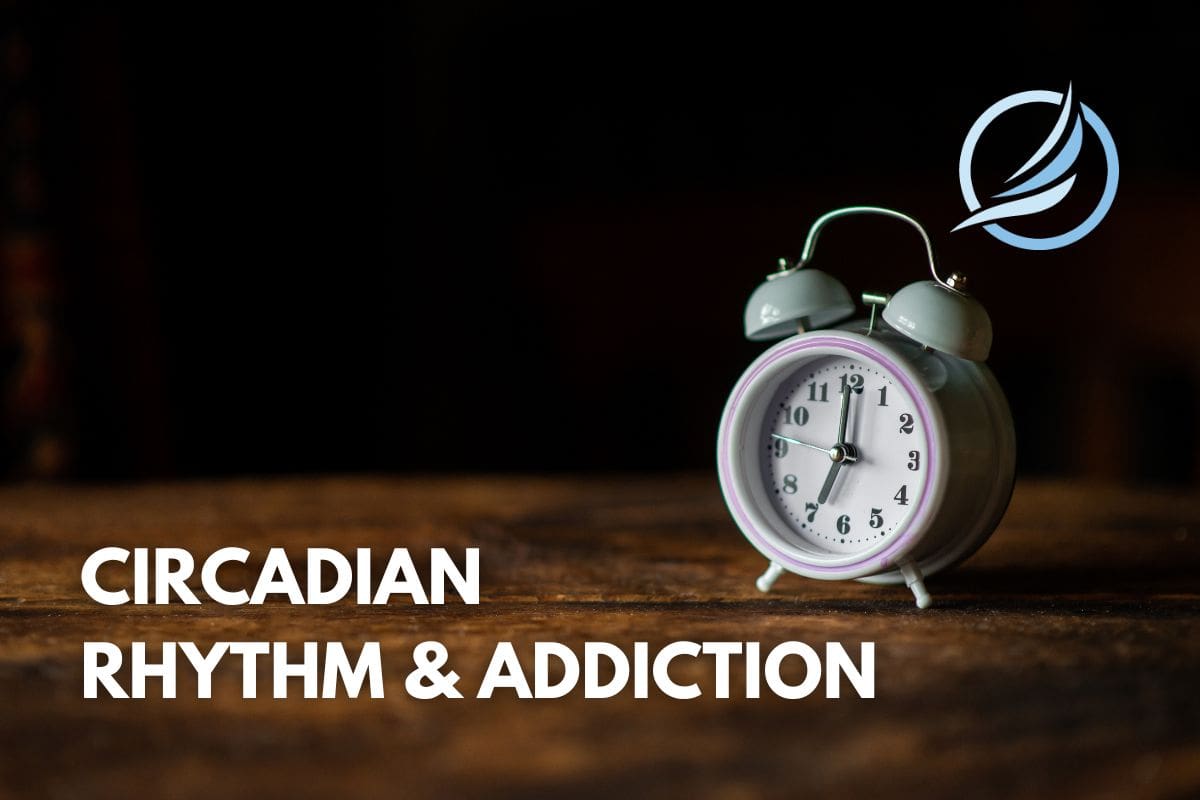The relationship between our circadian rhythm and addiction runs very deep, with 36% to 91% of people with alcohol use disorder experiencing insomnia. But while alcohol is the most researched substance concerning its effects on our internal clock, the reality is that addiction, in general, is associated with circadian disruption, regardless of the substance. What’s more, the relationship goes both ways.
Let’s explore how our natural sleep-wake cycle is related to substance use and explore some strategies for restoring your resetting clock during recovery.
What Are Circadian Rhythms?
Circadian rhythms are natural processes that regulate the sleep-wake cycle and repeat roughly every 24 hours.
Some of the many structures of our brain contain what is effectively a “biological clock” that determines the times to sleep, eat, release hormones, cool or heat our body, and perform many other vital functions.
Environmental factors, primarily our exposure to light and darkness, influence our circadian rhythms.
The Impact of Disrupted Circadian Rhythms
Altering the processes that govern our natural sleep-wake cycles can negatively impact our physical, mental, and behavioral health.
Having a disrupted internal clock can lead to adverse health outcomes such as higher rates of chronic disease, poor quality of life, and higher risks of accidents.
One of the leading causes of circadian disruption is night shifts, where people work during the night and sleep during the day when they are less likely to feel sleepy and more likely to experience poor sleep quality.
People who work at night might experience hindered cognitive functions (difficulty focusing and remembering, etc.), are less alert, more likely to be emotionally unstable, and more likely to develop diabetes and obesity.
Other common causes of disrupted circadian rhythms are sleeping at irregular hours, not receiving enough sunlight, traveling across time zones, and taking depressant or stimulant drugs.
The Link Between Circadian Rhythm and Addiction
While experts don’t fully understand the relationship between circadian rhythms and addiction yet, research suggests that there is a strong relationship between sleep, circadian rhythms, and substance abuse.
What’s more, experts believe that the relationship is mutual. Evidence from animal studies suggests that addiction can alter circadian rhythms, and altered circadian rhythms can make people more likely to develop addiction.
Let’s explore how they interact with each other.
Addiction’s Effects on Circadian Rhythms
Substances like alcohol, nicotine, and opioids significantly affect circadian regulation, leading to disruptions in sleep patterns, mood, and overall physical health.
The relationship between sleep disorders and addiction is well-known, as drugs can alter the natural sleep schedule by changing the release of neurotransmitters and hormones that regulate the circadian clock.
For example, alcohol is a depressant that can make us sleepy but may also worsen the quality of sleep, leading to fragmented sleep cycles and reduced REM sleep, which is essential for forming memories and helping our brain generate new cells.
On the other hand, nicotine, a stimulant, usually delays sleep and reduces our total sleep time. Long-term smoking can lead to irregular sleep schedules, mood swings, and mental health disorders. Other stimulants like methamphetamine may suppress hunger, another vital element of our internal clock.
Disrupted sleep, hunger, and other circadian rhythms can also affect metabolic and immune functions, further degrading our health and complicating recovery from substance addiction.
In summary, drugs have rewarding properties, and prolonged use alters our circadian rhythms and increases dopamine levels in some regions of the brain. These dopamine increases may lead vulnerable people to seek more drugs, falling deeper into addiction and circadian disruption.
Circadian Rhythms’ Effects on Addiction
The effects of drugs lead to circadian disruption, but the impact of circadian disruption also makes people more vulnerable to addiction.
A healthy person with well-regulated circadian rhythms usually has consistent sleep patterns and is emotionally stable, both of which are critical in preventing and managing addiction.
Disrupting these rhythms can lead to sleep disturbances, higher stress, and mood disorders, making us more vulnerable to substance use as a way to relieve or stimulate ourselves.
Additionally, if someone with disrupted circadian rhythms falls into addiction, drugs will further disrupt their rhythms, leading to a vicious cycle where both conditions reinforce and compound upon each other.
All these factors combine to make people with misaligned circadian rhythms not only more likely to become addicted but also less likely to recover, as irregular sleep and mental conditions can trigger relapse.
Ultimately, circadian rhythms have a close relationship with addiction that goes both ways. However, researchers still have much to learn about how they relate to each other and what are the best ways to treat co-occurring addiction and circadian disruption.
Strategies for Restoring Circadian Health in Recovery
Restoring circadian health during recovery is challenging, as research shows that many individual and environmental factors influence our rhythms and ability to stick to them during inpatient stays.
Individually, people may face insomnia, sleep apnea, anxiety, stress, and melatonin deficiencies from co-occurring illnesses like diabetes. Environmentally, people in an inpatient recovery program may face noise from staff activity, bright lights, and regular checkups for vital signs.
It’s hard to overstate the importance of sleep for recovery
Navigating these challenges is complicated, but experts have developed a few strategies to help us regain our normal circadian rhythms. These are some of the most effective ones:
- Gradually adjust your schedule. Make small daily changes to your sleep times to reach progressively your desired schedule.
- Get morning light exposure. This helps reset your sleep cycle, especially if you’re trying to wake up earlier.
- Change meal times. Align your eating schedule with your new sleep schedule to reinforce the change. Eating breakfast quickly after waking up and avoiding late dinners helps shift your rhythms to the early side.
- Limit caffeine. These can disrupt sleep and affect sleep quality, especially later in the day.
- Avoid late-night exercise. If possible, engage in physical activity earlier to promote better sleep.
- Reduce artificial light at night. Dim indoor lights as the time to sleep approaches, and avoid screens before bedtime to minimize sleep disruption.
These research-backed tips will help you realign your circadian rhythms with your natural tendencies, improve your cognition, allow you to rest better, and stabilize your mood, all crucial factors for recovery.
Seek Professional Help for Substance Addiction
Internal clock disruptions are expected during addiction, leading to irregular sleep hours and eating schedules, higher risk of disease, and emotional instability. To make matters worse, circadian disruptions also make us vulnerable to addiction, leading to a vicious cycle.
If you or anyone close to you faces addiction and has disrupted circadian rhythms, seek professional help from your general practitioner and specialized addiction support.
Counselors and other mental health specialists can help create personalized plans that adjust to your needs and provide relapse prevention, helping you address both the addiction and the misaligned internal clock to build a strong foundation for sobriety.


































